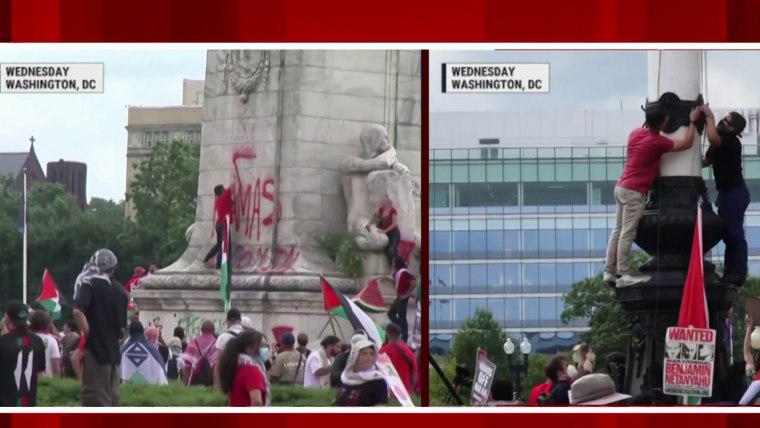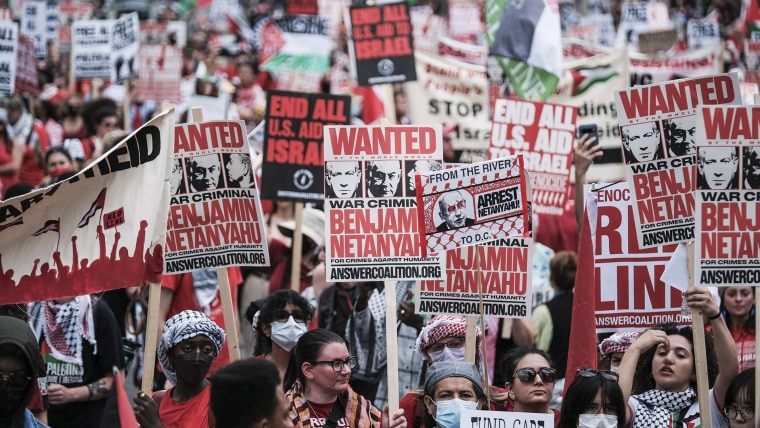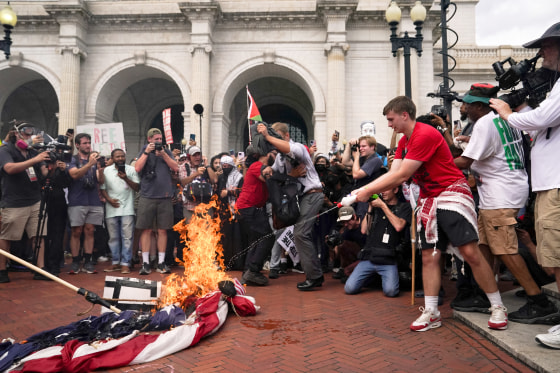Images of protesters burning American flags are always divisive.
But the scenes emerging from demonstrations in Washington during Israeli Prime Minister Benjamin Netanyahu’s speech to Congress were especially so, given some protesters’ open support of Hamas.
Equally predictable? The immediate calls to ban and punish flag burning that arose as criticism of the protests snowballed.
Yes, you have the right to burn the American flag, but with some caveats.
It is a question Americans continue to spar over, even though it is one the Supreme Court settled 35 years ago in Texas v. Johnson. In that case, the court affirmed that the government cannot punish offensive expression in service of protecting national symbols. Put simply, our anthem and our flag are not weighted more heavily than our rights.
But supporters of a ban got a boost from former President Donald Trump this week when, appearing on “Fox & Friends,” he advocated for congressional action and “a one-year jail sentence if you do anything to desecrate the American flag.”
“Now, people will say, ‘Oh, it’s unconstitutional,’” the Republican presidential nominee added. “Those are stupid people that say that.”
Vice President Kamala Harris — the likely Democratic nominee — released a statement, as well. Unlike Trump, she did not call for a ban on flag burning, instead stating that the flag should “never be desecrated.”

Let’s get a few things out of the way: Yes, you have the right to burn the American flag, but with some caveats.
You do not, of course, have the right to steal and vandalize a flag you do not own, and you may not be able to burn a flag in protest in any and all public spaces because of safety regulations. Police reportedly made arrests connected to protesters’ alleged theft and destruction of flags in the park outside Union Station, as well as other acts of vandalism.
The conversations spurred by Trump and other advocates of a flag burning ban, however, extend far beyond criminal acts and well into purely expressive conduct. At its core, what’s at stake here is the right of people across the political spectrum to express deeply unpopular political views and be free of retaliation from the government they are criticizing.
Flag burning may be a deeply unpopular form of political expression, but it is nevertheless protected.
Flag burners are rarely sympathetic free speech test cases for many Americans, but distaste for the incendiary way they express their opposition to the government should not lull us into accepting censorship rules that would be more at home in China or Russia than in a free country.
Similar issues were recently raised in a court thousands of miles away that should illustrate to Americans the peril of allowing the government to erode the right to criticize or mock national symbols. In Hong Kong, the center of an ongoing crackdown on dissent, a man was found guilty last week of insulting China’s anthem after covering his ears while it played at a volleyball game.
That conviction should serve as a warning bell for Americans, not a playbook to follow.
Flag burning may be a deeply unpopular form of political expression, but it is nevertheless protected. That’s actually a sign of the wisdom of our First Amendment, not its stupidity. It suggests a confidence that critics of the U.S. and its symbols can be moved to change their minds through persuasion, a hallmark of a free and healthy society, rather than force.

Confining people to jail cells for burning the flag is far more likely to validate that they were right to oppose and mistrust the U.S. than to prove to them the sanctity of its symbols.
“The way to preserve the flag’s special role is not to punish those who feel differently about these matters,” Justice William Brennan wrote for the majority of the Court in Texas v. Johnson. “It is to persuade them that they are wrong.”
His words are as true today as they were decades ago.
Our speech rights may not be as tangible as a flag, but they are in far greater need of protection than our symbols. New flags can and will be sewn and raised, but a desecrated First Amendment would be much more difficult to repair.
